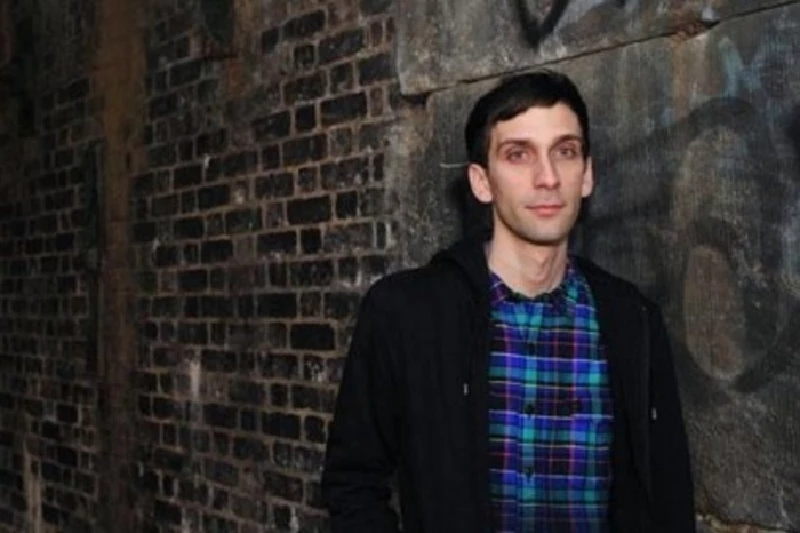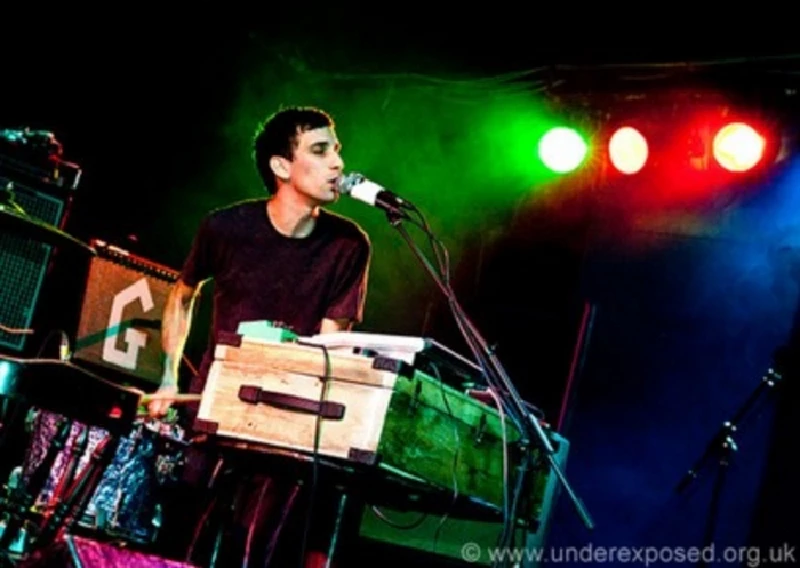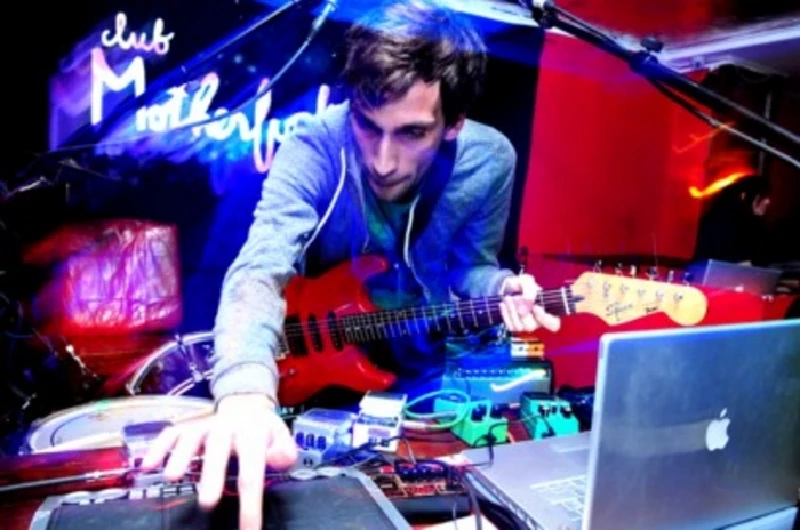Miscellaneous - Interview
by Mark Rowland
published: 22 / 5 / 2009

intro
Mark Rowland speaks to Turin-born, but London-based musician Alessio Natalizia about his bedroom project Banjo or Freakout and forthcoming debut alabum
If the rapid development of technology over the past decade has brought anything to our musical landscape, it’s the boost it has given the self-reliant, DIY aesthetic that has trundled along under the radar for years. Making music at home is now easier that it has ever been – cheap software such as Garageband offers bedroom composers the means to produce layered and reasonably high quality recordings without any prior knowledge required. On top of that, the internet and blog culture offers them a chance to promote themselves away from the usual channels, creating a following while cutting out the middle men of the record industry and the music press. While a lot of the music the industry is offering us is generally dull, vacant and derivative, this renewed upsurge in DIY is producing some of the most interesting and memorable music of this era, something that it will one day hopefully be remembered for in the annals of rock history. The music produced via this DIY path mirrors late 70s post-punk in its attitudes and approaches to music, though it doesn’t sound like it. The access to a varied range of sounds and music and the ease at which sounds can be sampled or reproduced at home has led to several artists taking a sort of ‘melting pot’ approach to their own music, incorporating any sounds or techniques that appeal to them and throwing them all in together. What results is a mixture of organic and synthesised sounds, a wash of different effects and different musical styles or techniques that bring to mind very different genres. Examples include Atlas Sound, the side project of Deerhunter’s Bradford Cox, which mixes samples, shimmering guitars, sporadic beats and synthpop inflected electronics, and Deastro, whose music often sounds like a collaboration between Brian Wilson and Aphex Twin. Banjo or Freakout is another autonomous artist producing interesting music at home, mixing a wide range of influences into one dense and distinctive sound. Italian ex-pat Alessio Natalizia started Banjo Or Freakout in late 2006, messing about on his girlfriend’s laptop while she was at work. What started off as a casual hobby became a more serious project for Natalizia, who played in bands in his hometown of Turin before moving to London. His sound at any one time will utilise elements of 70s krautrock such as Can, cut 'n' paste post punk acts such as This Heat and Cabaret Voltaire, the avant-dance of Arthur Russell, Warp style ambient electronica, the sampladelic sounds of Panda Bear and Animal Collective, afrobeat style polyrhythms, shoegaze, folk and indie rap – sometimes all in the same song. What results is music that is at once experimental and accessible, a product of music history that is also doing its own thing. Interest in the music of Banjo or Freakout has been steadily growing over the past couple of years, and 2009 is looking like it’s going to be Natalizia’s year. This interest increased through the blogosphere, as people re-posted Natalizia’s radical reworkings of songs by Sonic Youth, LCD Soundsystem, Burial and Radiohead, among many others, which were made available at his shows and his blog, banjoorfreakout.blogspot.com. After favourable coverage from all corners of the music press, including the Guardian’s website, the first proper Banjo Or Freakout releases – the single. 'Mr No', and the 'Upside Down' EP – followed each other in quick sucession, and Natalizia is now working on his debut full length album. PB : Your music has a fairly defined sound, which brings to mind a fairly broad range of influences. How long did it take you to develop your sound ? Were you consciously influenced by certain things, or did your sound develop naturally ? AN : I've been playing music for a long time now. I think I started more or less 15 years ago. I think like everyone I started almost emulating bands I was a fan of and then of course I naturally moved on and developed my own way to approach music. Banjo or Freakout started pretty casually without any idea of where I wanted to go. At first it sounded more noisy and weird and mostly instrumental then I decide to try to insert my voice and things started to come together. I started to work on my music intensely and to listen back anywhere I was, giving myself the idea of where I wanted to go with. The thing is that when you spend a lot of time writing, recording and listening back you kind of influence yourself. PB : What kind of things, musically or otherwise, particularly inspire you ? AN : Tons of stuff inspires me, from the bands I used to listen to when I was a kid to the big city I live in or the small city where I grew up or the people I know and of course Berlusconi's bullshit. PB : You've spoken about your one-take approach to recording your music. What is your usual approach to songwriting ? Does it take you a long time to build up a song ? AN : The one take thing still exists. I just don't like spending too much time on the recording process of every single track. I prefer to work on the whole thing, plus 90% of the times the first take is the best one. There are different ways I can come up with a song. It can start from a drum loop I stole from some records or a loop I'm made or some computer sounds or the song can start from a melody I have in my head, or from me playing guitar. They mostly start from one sound and then grow on top of that. PB : Now that you're releasing music commercially, has your approach to recording your music changed at all? AN : Not until now. I've been working exactly the same. I've been to the studio a bit more but did most of the job at home. I think this is going to change for the album I will start working on in the next weeks. PB : You give away a lot of music through your blog. How important do you think blogging is in promoting music now ? How do you decide what you give out for free ? AN : At first I was giving out for free basically everything I was recording but then I got a bit paranoid when I realized people were actually downloading it. So now I only upload stuff I'm 100% convinced about. Of course I believe blogging and free downloading and that kind of stuff is the future of music. Especially for small bands like me it is incredible to have the opportunity to give away your music to an unlimited audience that could actually care. I can wake up in the morning, record a track, put it on my blog and maybe someone on the other side of the world is going hear it in 20 minutes. It's incredible! PB : Your covers record really got people talking across the web. Why did you decide to make a record based on cover songs ? How did you choose which songs you covered ? AN : This covers thing started for fun at the end of 2007. I was with a friend and talking about our end of the year list so I thought I could cover one song from every record on the list. I started but never really finished and then got into covering also some of my fave bands and other massive hits I heard everywhere when I moved England like Amy Winehouse or Kake Nash etc etc... That's it really. Of course I am having fun when I record a cover. That's why they sound completely different from the originals. It wouldn't make sense otherwise. I'm basically stealing a couple of melodies and some words and try to make the song mine. PB : With your layered and distinctly personal approach to your music, what were the challenges in translating your songs live, and how did you get around them ? What can people expect from your live shows ? AN : The live show is different and I'm happy about it. I don't like bands that sound the same on recordings and live. We're a two-piece live and things get a bit more physical. I guess everything becomes more "rock" and less soundscapes, it is more song oriented but also more rhythmic. Basically it's loud and fun. PB : You've been getting a lot of positive press attention recently, has it seemed very sudden, or has it been more of a slow build ? AN : I don't think I'm getting so incredibly popular or anything. To be honest I hope I'll get more and more people talking about and listening to my music. PB : How do you feel about the interest your music is receiving at the moment ? AN : I'm always happy to hear what people think about my music and of course it is nice to have positive attention from people I respect. More than being nice for my ego having good press is really fulfilling because it makes me feel like I'm not wasting time passing hours recording shit. PB : Thank you.
Picture Gallery:-


most viewed articles
current edition
John McKay - InterviewRobert Forster - Interview
Cathode Ray - Interview
When Rivers Meet - Waterfront, Norwich, 29/5/2025
Spear Of Destiny - Interview
Fiona Hutchings - Interview
Chris Wade - Interview
Carl Ewens - David Bowie 1964 to 1982 On Track: Every Album, Every Song
Claudia Brucken - Interview
Shrag - Huw Stephens Session 08.12.10 and Marc Riley Session 21.03.12
previous editions
Heavenly - P.U.N.K. Girl EPManic Street Preachers - (Gig of a Lifetime) Millennium Stadium, Cardiff, December 1999
Boomtown Rats - Ten Songs That Made Me Love....
Beautiful South - Ten Songs That Made Me Love...
Oasis - Oasis, Earl's Court, London, 1995
Barrie Barlow - Interview
Trudie Myerscough-Harris - Interview
Pixies - Ten Songs That Made Me Love...
Dwina Gibb - Interview
Doris Brendel - Interview
most viewed reviews
current edition
Peter Doolan - I Am a Tree Rooted to the Spot and a Snake Moves Around Me,in a CircleVultures - Liz Kershaw Session 16.06.88
Vinny Peculiar - Things Too Long Left Unsaid
Garbage - Let All That We Imagine Be The Light
John McKay - Sixes and #Sevens
Lapsley - I'm a Hurricane, I'm a Woman In Love
Pulp - More
HAIM - I Quit
Billy Nomates - Metalhorse
Little Simz - Lotus
Pennyblackmusic Regular Contributors
Adrian Janes
Amanda J. Window
Andrew Twambley
Anthony Dhanendran
Benjamin Howarth
Cila Warncke
Daniel Cressey
Darren Aston
Dastardly
Dave Goodwin
Denzil Watson
Dominic B. Simpson
Eoghan Lyng
Fiona Hutchings
Harry Sherriff
Helen Tipping
Jamie Rowland
John Clarkson
Julie Cruickshank
Kimberly Bright
Lisa Torem
Maarten Schiethart